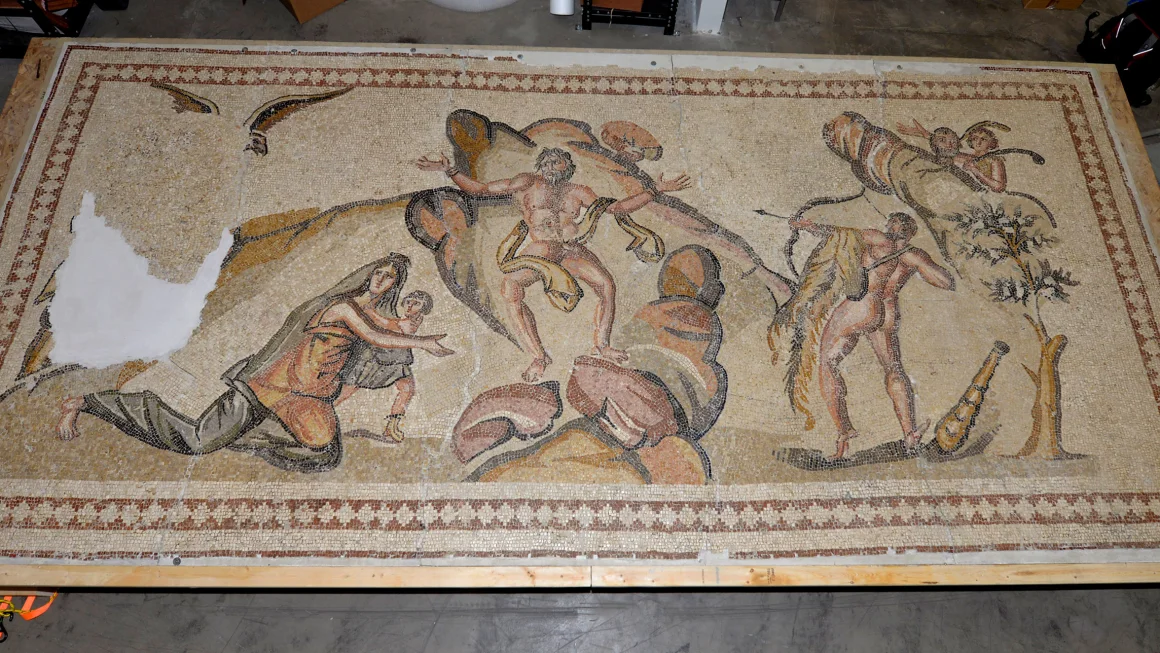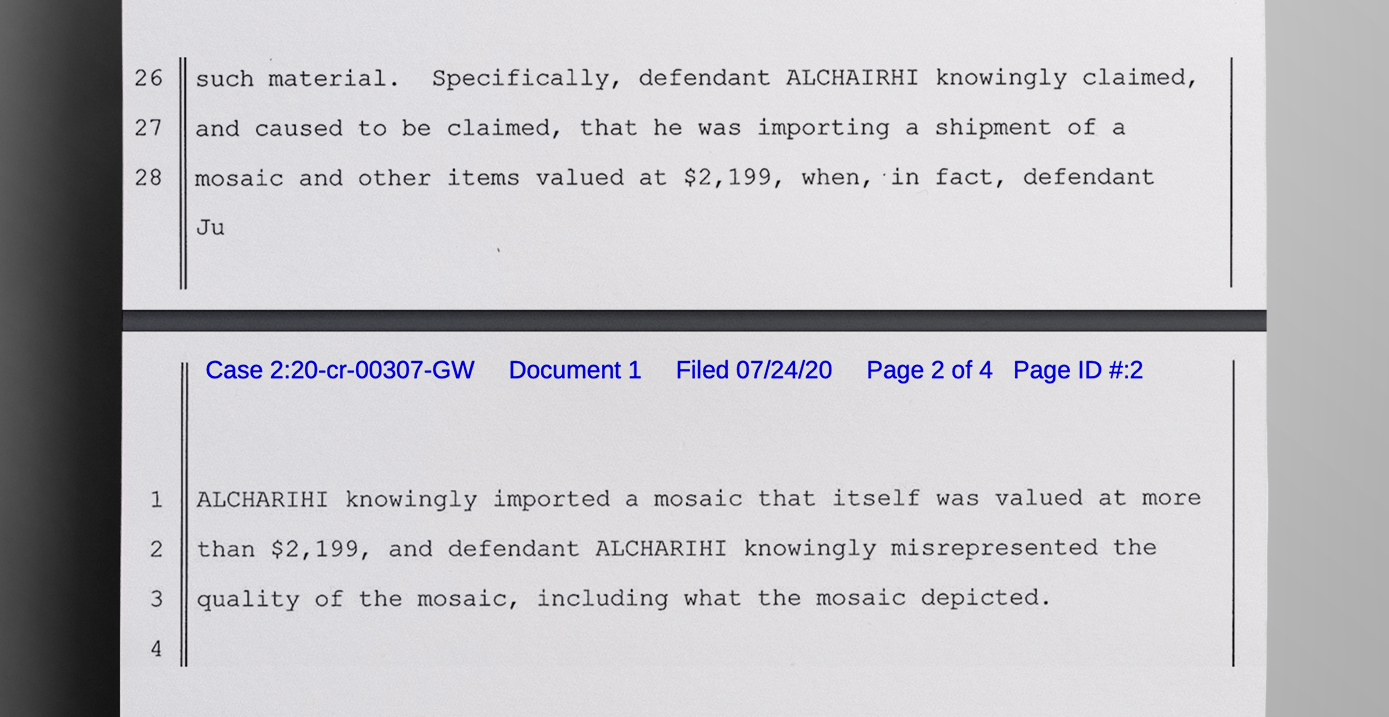After 8-Year Legal Battle, Palmdale Man Sentenced to 3 Months for Smuggling 2000-Year-Old Mosaic From Syria

A federal court has found Mohamad Yassin Alcharihi guilty of illegally bringing a millenniums-old Syrian artifact (pictured) to the U.S. Photo by U.S. Attorney, Central District of California.
After eight years of court battles over ownership of the $450,000 artwork and criminal charges related to its entry into the country, Mohamad Yassin Alcharihi was sentenced to three months in federal prison on Aug. 29 on one count of falsely classifying the information about the item, the U.S. Attorney for Central California announced in a press release.
The court’s judgment order states he will also serve one year of supervised release after completing his sentence. The government waived any fine, finding that Alcharihi “is unable to pay and is not likely to become able to pay any fine.” In announcing the conviction on June 21, the Department of Justice said the maximum sentence for the offense was two years in prison.

The government hopes the court will eventually rule that Alcharihi must forfeit the 15’ x 8’ depiction of Roman mythology’s Hercules and Prometheus – at least until it is returned to Syria, from where it is believed to have been illegally removed. It has been stored in a secure but undisclosed location since it was seized from Alcharihi’s garage.
A Long, Slow Journey
The wheels of the federal judicial system move slowly. Alcharihi, 57, was convicted on June 21, 2023, of importing the falsely classified mosaic and lying to U.S. Customs officials about the value and quality of the shipment. He was sentenced 14 months later.
Ciaran McEvoy, a spokesman for the U.S. Attorney’s Office, told The Daily Muck in an interview that several factors contributed to the almost-decade delay to get to this point – and it’s not over yet.
The indictment was handed down “right in the heart of the COVID-19 pandemic when courts were closed,” McEvoy said. “The government produced to the defense more than 30,000 pages of documents — many of them not in English — and the defense needed time to prepare for trial, especially in light of schedule conflicts for counsel.”
He said the judge has granted time for Alcharihi’s attorneys to file post-trial motions, and “we expect the defendant will appeal his conviction, and that process will take two years or so.”
The U.S. Attorney’s Office pointed out that the false declarations about the mosaic were made months after the United Nations Security Council adopted a resolution condemning the destruction of cultural heritage in Syria by Islamist terrorist organizations.
How It Began
In its June 2023 press release, the DOJ said Alcharihi bought the mosaic in August 2015 and had it shipped to the Port of Long Beach from Turkey. From the port, it was brought by truck to Alcharihi’s home.
Alcharihi’s efforts to recover the mosaic began on Oct. 3, 2016, when he filed a petition in federal court asking the government to release his property. The court rejected that request.
In its May 4, 2017, arguments to support retaining the mosaic, federal authorities said Alcharihi’s claims for regaining possession of the mosaic did not “outweigh the government’s interest in ensuring that smuggled antiquities are kept out of the stream of commerce.”
The battle over the mosaic moved from a civil fight over ownership to a criminal charge on July 24, 2020, when Alcharihi was indicted of bringing falsely classified goods into the country, as noted in an Immigration and Customs Enforcement (ICE) press release.
The indictment states Alcharihi said the entire shipment that contained the mosaic consisted of Turkish ceramic tiles valued at $2,199. Alcharihi paid approximately $12,000 for the large floor mosaic but knew it was worth much more. The prosecutors said he paid $40,000 to restore the mosaic before federal agents seized it in the March 19, 2016 raid.

The U.S. Attorney’s Office said In a May 25, 2018, press release that after the mosaic was seized, an expert concluded the artwork “was an authentic mosaic from the Byzantine Period depicting Roman mythology, and was consistent with the iconography of mosaics found in Syria, in particular in and around the city of Idlib, Syria.” He placed the value at $450,000.
‘Send a Message’
Prosecutors said the U.S. “has adopted import restrictions on archaeological and ethnological material from Syria.” They quoted a U.S. Customs and Border Protection statement that the nation shares “the international concern for the need to protect endangered cultural property.
“The appearance in the United States of stolen or illegally exported artifacts from other countries where there has been pillage has, on occasion, strained our foreign and cultural relations,” the CBP statement continued. “This situation, combined with the concerns of museum, archaeological, and scholarly communities, was recognized by the President and Congress. It became apparent that it was in the national interest of the United States to join with other countries to suppress illegal trafficking of such objects in international commerce.”
If the conviction and sentence are upheld, the U.S. Attorney’s Office expects the mosaic to be forfeited to the U.S. government, the spokesman told us.
“As to whether the mosaic will be repatriated to Syria, it’s too soon to tell,” McEvoy added.
The spokesman said the three-month sentence “is less than what the government requested,” but prosecutors “hope that any amount of prison time will send a message that there are consequences — including prison — to individuals who deal in antiquities smuggling.”
Discover More Muck
First AI-Powered Lawsuit Exposes California’s Eco-Fraud Empire
Feature John Lynn | Apr 10, 2025

Former Child Soldier General Lied to Get Green Card
Report Strahinja Nikolić | Feb 27, 2025

Weekly Muck
Join the mission and subscribe to our newsletter. In exchange, we promise to fight for justice.
Weekly
Muck
Join the mission and subscribe to our newsletter. In exchange, we promise to fight for justice.





